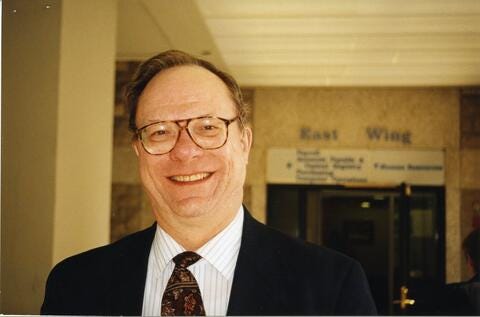And we shall set the truth free
On truth-seeking, the Trucker Convoy, and the Thought Farming podcast
When I was a first-year political studies student at the University of Saskatchewan, our professor greeted the class as “truth-seekers.” It was unnerving—the thought that we were there not for an easy elective, or because the time slot fit our schedule, or on the path to law school.
No, we were there to seek truth. And if we weren’t, we should’ve been—or at least this is what the formal lecturing style and serious yet animated demeanor of our teacher conveyed.
Professor Jene M. Porter introduced us to some of political philosophy’s greatest hits that year. In his Southern accent, using a reader of the primary texts that he himself had edited, he took us through seminal thinkers of the Western canon—Plato and Aristotle, Hobbes and Locke, Mill and Marx.
The periods and preoccupations of these thinkers varied. But our shared task remained constant. We were seekers of truth, of humanity and its order, in its myriad presentations.

Over the next few years, I took every course Dr. Porter offered. His teaching left an indelible mark. For years, whenever I read works of political philosophy aloud, I’d slip into an inept drawl of the Arkansas Ozarks.
It’s likely—though by no means solely—a testament to his influence that the phrase “speaking my truth” still makes me cringe. As though there were no truth as such, on which we all have our limited perspectives. As though our task were not to enlarge and refine our perspectives on it, rather than mistake the part for the whole.
How do we know the truth? How do we know anything at all? Books on the topic fill libraries. To the mind of this seeker, our ability to know it begins with a kind of faith, a confidence that it is discoverable—and that we have the tools if we care to use them.
An analogy might be an archaeological dig or a fossil embedded in a rock face: we know it’s there, but not its full shape or extent. We have only outlines to work with at first and need to proceed with care—in some cases, free it from the debris hiding it.
Because the truth is not always simply available. Often, we have to dig for it. We have to set it free. Truth can be forgotten. It can also be hidden or obscured—by lies, for example, or by an ideology. Literally the “logic of an idea,” ideology might be erected as the framework of an entire alternate reality, a facsimile of the truth it conceals.
This, in my view, is what occurred with the dominant interpretation of the Freedom Convoy that arrived in Ottawa in January 2022. I was fortunate to experience it first hand from beginning to end. Doesn’t mean I know the whole truth of it, just that I was able to gain a perspective that others may not have.
I discussed the event on a recent podcast with Marco Navarro-Génie of the Haultain Institute in Alberta.
Marco reminded me of a version that is still commonly held today: the idea that members of the convoy came to Ottawa with an intention to incite violence, even to commit sedition. Some maintain this version despite the recent Federal Court ruling that there was no public order emergency calling for the Emergencies Act.
Marco sought my first-hand impression in an effort to expand the store of reflections, in his words, to help “correct the record” about the convoy. In my words, we’re trying to recover the truth of an event that has been obscured by ideology.
In the podcast, I explained to him only what I could—my own limited experience and perspective. Others will have theirs. What was clear to both of us was that accounts of Ottawa residents who may have been favourable to the convoy are sorely lacking.
The podcast is about an hour long. It covers roughly the following themes:
4:40 - 14:15 Anticipation of the convoy, reasons for supporting it.
14:15 - 20:24 Experiences on arrival. The Rideau Mall. The Nazi flag.
21:23 - 25:30 The second weekend. Family fun. The “occupation.”
25:30 - 38:00 The third week. Zen truckers. Counterprotests. Jerry cans.
38:00 - 42:57 Comparing to Indigenous protests. The racism accusation.
42:57 - 52:19 Sedition. Dirty tricks. The peaceful miracle. Protest evolution.
52:20 - 56:30 Taking stock: what the convoy did and did not achieve.
56:30 - 65:00 What now? Channelling resistance. Ottawa perspectives.
Memory is fallible and fades quickly. I do hope that others who live here will come forward to offer their perspectives as well. Collectively, it seems to me, we can recover and restore the truth of this crucial event in our country’s history.




You're right, Jodi, about the globalists not understanding basic human inclinations that the truckers had in buckets - compassion, respect, and love for fellow humans.
Glad you mentioned Bruce Pardy, I found his NCI testimony so helpful. Until then, I hadn't understood how the checks and balances on the administrative state have been diminished. It was a real eye opener for me.
btw, I'm grateful to know about the Haultain Institute, another Canadian source of critical thinking.
I really appreciated hearing your impressions of the Convoy, Jodi. As I listened, I felt a flood of emotions. I clearly remembered my elation at seeing the truckers head to Ottawa and then my trepidation, wondering what was going to happen. How it ended was so shocking, probably even more so for those like you bearing witness on the Hill.
So why did it have to end that way with the brute force of the Canadian state coming down on peaceful protestors? It would seem now that those upstart truckers were challenging far more than the Canadian state, although at the time, that's as far as I could imagine given the harsh lockdowns and vaccine mandates imposed on Canadians by all levels of government.
Two years later, I see things a bit differently. Katherine Watt’s legal research exposes the long game: in meticulous detail, she lays out the U.S. legislation passed over the last 40-plus years that facilitates a transfer of power from Congress to the U.S. Director of Health and Human Services and, in turn, the National Security Council and the Department of Defense (DOD) under a declared public health emergency (PHE). According to Watt, a PHE is in effect a National Emergency akin to a declaration of war that suspends the Constitution and enables the DOD to produce countermeasures under Emergency Use Authorization (EUA) outside the commercial regulatory framework for investigational drugs.
So if the US declares a National Emergency with all its attendant consequences, what pressures does that put on the U.S.’s military allies and through what mechanisms? The WHO and its regulations, yes. But are there other avenues of pressure that we have yet to learn about that are military in nature? Was Trudeau encouraged or pressured to display a show of force? I’m curious because I've come to see Trudeau and the Emergencies Act as a surrogate for the U.S. military-industrial-bio-pharmaceutical complex, or whatever one wants to call it.